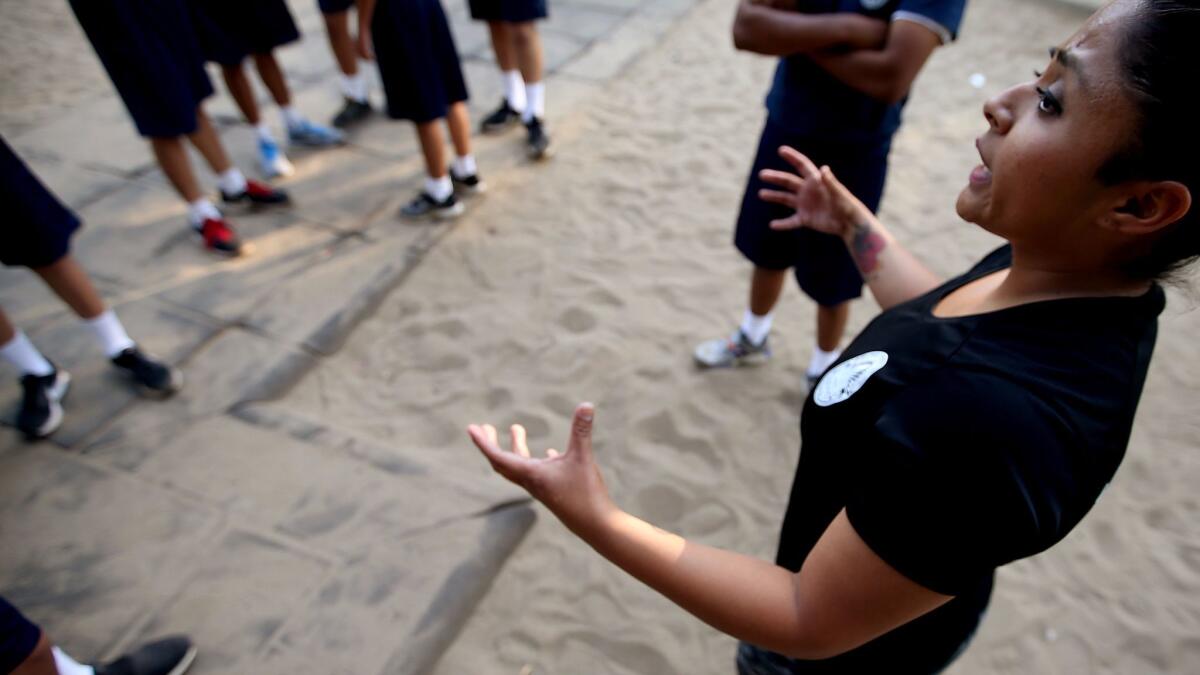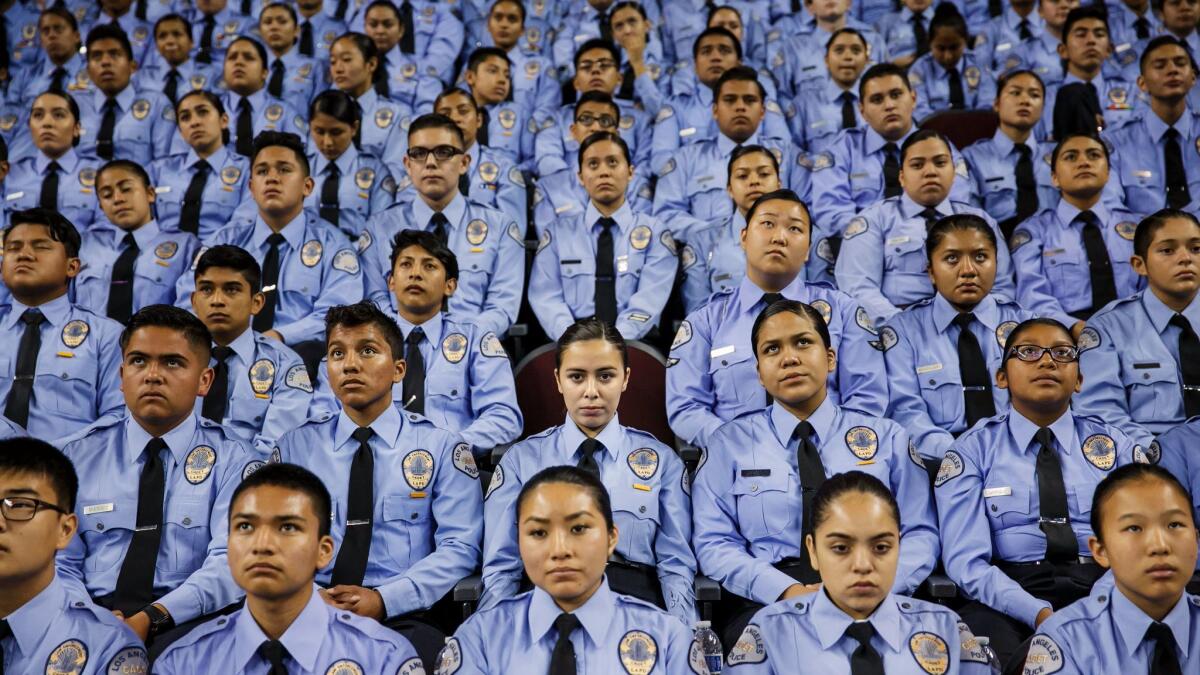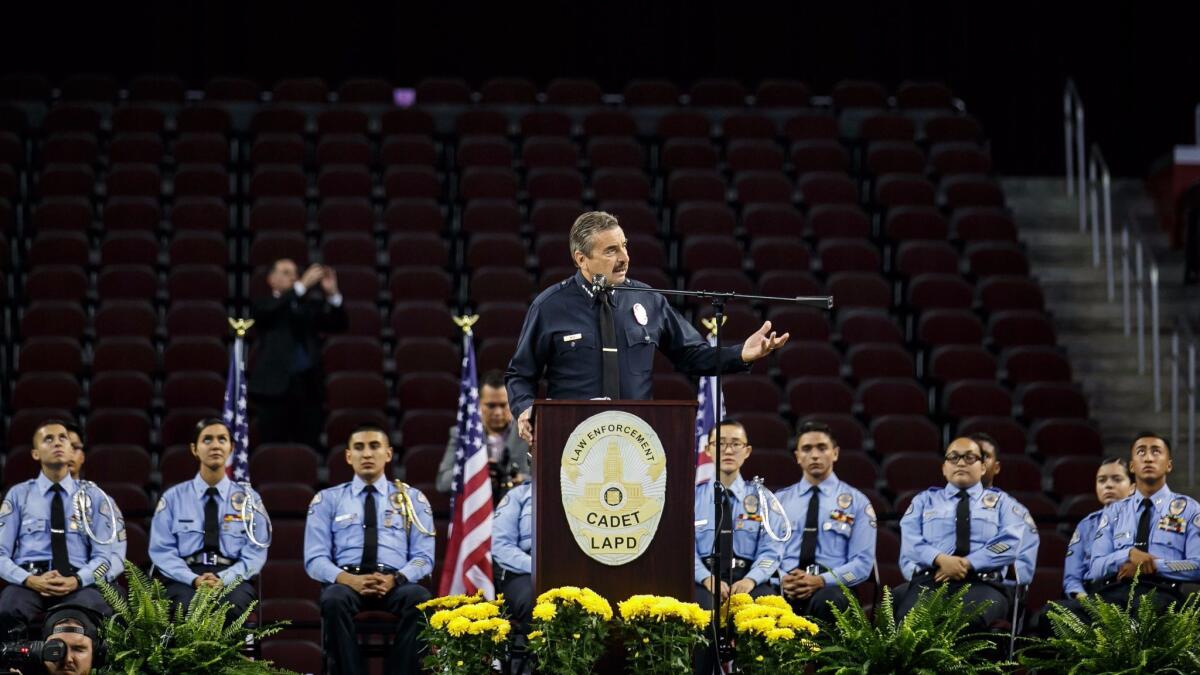Sex, joy rides and car chases: Scandal in LAPD youth cadet program sparks alarm and calls for reform

The LAPD cadet program is under two separate investigations. (July 24, 201&)
- Share via
The police officer talked strategy with the young cadets as they prepared for an obstacle course competition.
Should the strongest person go first? The tallest? Teamwork was important, said the officer, Ruby Aguirre.
As the teenagers — addressing everyone with a “Sir” or “Ma’am” — powered across monkey bars or scrambled to catch footballs in Elysian Park earlier this month, the scene seemed straight out of a recruiting brochure for the Los Angeles Police Department’s cadet program, which enrolls over 2,000 local youths.
But a recent scandal involving cadets, stolen police cars and illicit sex was not far from their minds.
The disturbing events have illuminated deficiencies both in the cadet program and in how the LAPD keeps tabs on its cars and other equipment.
The department’s written manual governing contact between cadets and adults has not been updated in more than a decade, even though a police officer was recently convicted of sexual crimes involving a 16-year-old cadet.
In the LAPD’s equipment rooms, officers say a culture of laxity has become the norm, creating opportunities for anyone — volunteers, cadets or officers — to walk off with property.

Some of the seven cadets who were arrested last month allegedly drove a police car beyond county limits, pulled over at least one motorist and led LAPD officers on car chases ending in crashes that could have hurt or killed someone.
A 31-year-old police officer who allegedly had sex with a 15-year-old cadet may have helped the cadets steal cars as well as Tasers, a bulletproof vest and other police equipment. The officer, Robert Cain, has been charged with sexually assaulting the girl.
LAPD Chief Charlie Beck has ordered a top-to-bottom review of the cadet program, the department’s signature youth initiative designed to mold model citizens rather than future police officers. City Councilman Mitch Englander, who chairs the city’s Public Safety Committee, has asked that the inquiry be expanded to include all of the LAPD’s youth programs. A separate review by the Los Angeles Police Commission’s inspector general is also underway.
There are clearly major flaws and problems and holes in the system that have to be corrected immediately.”
— City Councilman Mitch Englander
LAPD brass and other city officials emphasize that they still believe in the cadet program and intend for it to continue. The allegations involve a small number of cadets, they note, and were apparently centered on one police station: 77th Street. Beck has suspended the program there and at Pacific station, where one of the cadets was based.
Some say the controversy has been as damaging for the cadet program as the 1990s corruption scandal that rocked the anti-gang unit at Rampart Division was for the department as a whole. They stress, however, that the vast majority of cadets are upstanding young people.
Questions remain about exactly how the latest misconduct occurred, who ultimately will be held accountable and why some changes, such as updating written policies on youth programs, were not made earlier.
City officials and others have raised particular concerns about how the alleged misconduct went undetected, noting that it might have escalated had the teens involved in the car chases not been caught.
“There are clearly major flaws and problems and holes in the system that have to be corrected immediately,” Englander said.
**

For decades, the LAPD ran an Explorer program affiliated with the Boy Scouts of America. Because of the Scouts’ ban on gay leaders, the LAPD began its own cadet program in 2010, broadening it to include teens who were not interested in law enforcement as a career.
Some LAPD cadets pitch in at police stations, working the front desk or filing papers. But the program is largely centered on weekly cadet meetings and volunteering in the community, with youth services officers like Aguirre acting as mentors and confidants.
Aspiring cadets must attend an academy, rising before dawn every Saturday for 15 weeks before earning the right to wear the powder-blue shirt and narrow black tie.
As cadets, they hand out bobbleheads at Dodgers games and direct traffic at Hollywood Bowl parking lots. They listen to lectures by police officers on leadership and time management. They continue their physical fitness training, building grit as well as muscle.
Some are model students who want to improve their leadership skills. Others are forced into the program by parents who hope it will set them straight. To become cadets, teenagers must have at least a “C” average and a clean criminal record.
Beck has not explained how Cain, who worked the equipment room at the 77th Street station was able to befriend the 15-year-old girl or exactly what role Cain played in the equipment thefts. Cain and the girl exchanged text messages that pointed to illegal sexual activity and showed the officer was aware of the thefts, Beck said.
Cain had previously applied to supervise cadets as a youth services officer but was not chosen for the job.
After Beck personally arrested Cain, investigators found more than 100 firearms, including illegally modified assault rifles, in Cain’s home. Cain has been in jail since July 13, shortly after he was charged with 10 felony counts related to some of the weapons.
On Thursday, Cain was charged with sexual crimes involving the 15-year-old cadet — two counts each of oral copulation of a person under the age of 16, lewd acts upon a child and unlawful sexual intercourse.
Cain is accused of sexually assaulting the cadet three different times at three different locations on June 14, the same day that three of the cadets led police on the car chases.
No charges have been filed against any of the seven cadets, who range in age from 14 to 18.
LAPD officials, who are still investigating the incident, do not believe that any other officers were directly involved and have not taken steps to discipline supervisors who oversaw Cain or the cadet program, a department spokesman said.
Since Beck became chief in 2009, he has expanded the size of the cadet program to reach more young people, including those from impoverished, gang-ridden neighborhoods who may be at risk of getting in trouble.
“We want to make kids into better, whole people,” Beck said in a recent interview. “We’re not just going to pick perfect children that come from solid upbringings with no baggage, no history.”
Regardless of what policies were in place, Cain and the cadets should have known better, Beck said, attributing the incident to a “failure of character.”
**
Scandals have hit the LAPD’s youth programs before.
Nearly two decades ago, a 33-year-old police officer was accused of having sex with an Explorer and improperly touching two others. Seven other officers were accused of administrative breaches, including inadequate supervision.
In 2006, Officer George Stan pleaded guilty to 15 felony counts of sexual assault involving seven victims, two of whom were involved with the Explorer program.
Last year, an LAPD youth services officer named Abel Montes de Oca was arrested after he allegedly sent sexually explicit texts and suggestive song lyrics to a 16-year-old cadet.
Montes de Oca was convicted in January, served four months in jail and was ordered to register as a sex offender. He is no longer on the force.
After the incident, LAPD officials examined how youth services officers are recruited and how Montes de Oca was selected. But they did not undertake a broader review of the cadet program, Beck said.
The department’s Youth Programs Manual, last revised in 2006, is so dated that it refers to Explorers, not cadets. It forbids sexual relationships between Explorers and police officers while making no mention of social media contact.
Officers who work with youth programs are not required to read the manual but are held accountable for violating its rules, said Cmdr. Jeffrey Bert.
Bert has been overhauling the manual since he took command of youth programs about a year ago. The revised version will include “very strict guidelines” on social media contact between cadets and LAPD personnel other than youth services officers, Beck said.
Following the latest cadet scandal, Beck issued a department-wide directive forbidding most one-on-one contact between police officers and youth program participants, restricting social media contact to necessary business and prohibiting youths from driving LAPD vehicles.
Other agencies have been more proactive. When Sgt. Kenn Roller revised the L.A. County Sheriff’s Explorers manual soon after taking charge of the program four years ago, he was influenced by a 2011 sex scandal involving a deputy and a 16-year-old girl at Cerritos station.
The additions he made to the manual included language that prohibits texting or emailing between youths and deputies not directly associated with the Explorers.
Roller said he periodically updates the manual, which provides guidelines for a program numbering about 400 teenagers.
“My goal was to take out the ‘Nobody told me, or I didn’t know’ clause as an excuse for bad behavior,” said Roller, who was once an Explorer himself.

As the LAPD looks to tighten its rules for the cadet program, Beck and others said the stricter guidelines should still allow for supportive relationships between teens and youth services officers. It is not uncommon for a cadet to describe an officer as a “second mom” or for an officer to attend a cadet’s high school graduation.
”We want them to develop relationships with cadets — that’s why they’re there,” Beck said. “We don’t want to limit that. What we want to do is make sure that we don’t have people like Cain who use the program inappropriately.”
We want to make kids into better, whole people. We’re not just going to pick perfect children that come from solid upbringings with no baggage, no history.
— LAPD Chief Charlie Beck
Written policies will not stop a person determined to violate the rules, and officers should already know to keep their relationships with cadets professional, said Englander, the city councilman. But he questioned the lack of an updated written manual.
As a reserve police officer, Englander said he has observed problems with station equipment rooms, known as kit rooms, similar to those described to The Times by police officers who were not authorized to speak on the record.
The officer in charge is often called away to other duties, leaving the room unmanned. Officers at the end of their shifts will sometimes drop an item such as a car key on the counter, where it remains unattended until the kit room officer returns, Englander said.
Every item in the kit room has a bar code and is scanned in and out. Officers receive an email if the item has not been returned in time.
But Englander said the system could be tightened to immediately notify an officer if something is checked out in his or her name and to notify supervisors if equipment is checked out by someone off duty.
Such a system might have caught the cadets, who allegedly took a car by using the name of a sergeant who was on vacation, much sooner.
LAPD officers have their own handguns but must check out other essential equipment, including radios, at the beginning of every shift. To cut down on the kit room officer’s workload and the number of items that need to be tracked, the department may issue a radio to every officer, Beck said.
**
Until this year, Aguirre, the youth services officer, was a street cop whose assignments included undercover narcotics. She decided she wanted to make a difference in young people’s lives.
Now, she helps lead a group of 26 cadets based at LAPD headquarters. Each of the department’s 21 police stations has a cadet post, with some numbering over 100 cadets.
The cadets readily approach Aguirre with their problems. They affectionately call her “Mama Bear” because of her nagging reminders to wear sunscreen. She tells them never to tarnish their family name or the LAPD cadet badge.
“There’s a microscope on those bad kids,” said Aguirre, 31. “My kids tell me: ‘I’d never do that. My mom would kill me. You would kill me.’”
At Elysian Park, Rachel Ramirez said that after a year and a half as a cadet, she has overcome her shyness.
Unlike many of her fellow cadets, she wants to join the LAPD.
The cadets who misbehaved made a choice, said Ramirez, 17, a high school senior. All she can do is make better choices.
“It’s on them,” she said. “Not on me.”
cindy.chang@latimes.com | @cindychangLA
kate.mather@latimes.com | @katemather
ALSO
Years after brutal stabbing, East L.A. bar owner’s slaying solved by LAPD reserve police officer
USC received more than a year of questions about former medical school dean’s conduct before scandal broke
Massive Detwiler fire near Yosemite National Park is 40% contained
More to Read
Sign up for Essential California
The most important California stories and recommendations in your inbox every morning.
You may occasionally receive promotional content from the Los Angeles Times.















